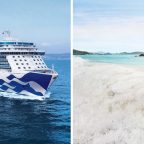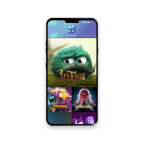The frustration-free vacation is arriving on Royal Caribbean
Royal Caribbean Cruises is rolling out an unprecedented wave of digital innovations touching every aspect of its business, charting a course for a world where travel frustrations have disappeared, erased by technology that is transforming cruise ships from stem to stern.
Most visible to consumers through a guest-empowering app that will blanket the company’s 48-ship fleet over the next two years, the surge of innovation will also banish check-in lines at ports, equip crew members to anticipate guests’ needs, and enable giant cruise ships to sail through the water on a fuel-saving curtain of air.
“The pace of change is relentless—and so are we,” said Richard D. Fain, RCL’s chairman and CEO. “We are harnessing a range of technologies to enhance every facet of our business, every minute of our guests’ vacations, and every inch of the ships we build.”
Jay Schneider, RCL’s senior vice president, digital, said one focus of RCL’s company-wide innovation initiative is zeroing in on wasted effort and wasted energy. “We are finding ways to eliminate friction and frustration, giving guests more time to make the memories that make vacations special,” said Schneider. For example, guests will:
- Board ships in the time it takes to order fries from the drive-through, skipping check-in lines thanks to facial recognition technology that knows who they are on arrival.
- Sign up for shore excursions, order drinks and make dinner reservations without ever leaving their chairs by the pool thanks to an intuitive app on a device most of them already have—a smartphone.
- Indulge in VR and AR experiences that transform ship spaces into virtual environments and interactive games, where stateroom ceilings might be replaced by starry skies, the walls of a restaurant can transform into the sights and sounds of an outdoor café and digital signs challenge you to play an arcade game.
“Consumers are buying experiences now, not things,” Fain said. “So we are creating ways for them to design vacations rich in made-to-order, memory-making moments, and even providing recommendations based on what they have enjoyed before or shared with us about their preferences. And with our mantra of continuous improvement, our strategy is to constantly upgrade the guest experience across the fleets of all our brands.”
The technological transformation also encompasses areas beyond the guest experience, including innovations to make ships more energy-efficient, enhance ship management and put more connectivity into the hands of crew members than ever before.
RCL’s invitation-only Sea Beyond event – held at the site of a historic shipbuilding facility in the Brooklyn Navy Yard and exclusively sponsored by EY – offers 37,000 square feet of hands-on examples of how digital technology is driving change across the company’s fleet, whose brands include industry leaders Royal Caribbean International, Celebrity Cruises and Azamara Club Cruises.
“EY is proud to be the exclusive sponsor of Sea Beyond. We understand the powerful impact and positive experiences digital transformation can create,” said Bob Patton, Americas Vice Chair of Accounts. “Working together with the Royal Caribbean team has truly been an amazing experience,” continued Patton. “We have been partners for over a decade, and are excited to continue collaborating to achieve breakthroughs in the digital innovation space.”
For guests: less friction, more time to make memories
“Our vision is to make the guest experience hassle-free, personalized and fun,” said Schneider.
One specific focus is removing time-stealing moments from the cruise experience. “Time spent in line—whether you’re waiting for your food, waiting for your bags to arrive, waiting on a table, or booking an excursion—is time stolen from your time off,” Schneider said. To return that time to guests, the company is combining technologies ranging from facial recognition to RFID tagging to GPS mapping to Bluetooth-enabled beacons to streamline boarding, manage check-ins automatically and improve wayfinding.
“Many of these same technologies are being deployed to put the power to manage your vacation in the palm of your hand,” said Schneider. “Our new app will make it simpler than ever to book and plan your cruise vacation from home or with a travel agent. Once on board, you can navigate our ships with interactive maps and guides, explore the ship with cool features like x-ray vision, or order drinks that can be delivered to you wherever you are on the ship.” The app, along with the next generation of the company’s WOW Bands, will also unlock guest staterooms and enable guests to control stateroom lighting and temperature.
An initial release of the cruise guest app is already available on selected ships in RCL’s fleet. Schneider said RCL will continue to refine the app, adding new ship-specific features and capabilities, with each subsequent release. “Our aim is to have the app enabled on about 15 percent of our fleet by the end of this year, and more than double that by the end of 2018,” said Schneider.
Other innovations showcased at Sea Beyond are in the “concept car” phase, said Schneider. “Sea Beyond attendees will get glimpses of what happens when we let our imaginations run wild. So think of sampling an exotic dessert where, with each bite, the entire environment changes – at least virtually. Or imagine a stateroom where you not only control the lighting and the temperature, but can change the scene from starry night to rainforest canopy or island home with the touch of a button.”
For crew: better interaction with guests and home
The innovations enriching the cruise guest experience will be complemented by a suite of tools for crews, as well. For example, the app-enabled offerings for guests will be mirrored on the crew side by mobile applications that help crew members check-in guests, complete required paperwork, track delivery of guests’ bags to their staterooms, and interact with guests and anticipate their needs throughout their vacations.
In addition, crews will have access to easier means to manage their own schedules, stay connected to friends and family while onboard, and stay connected to RCL during their off-contract periods.
“We regularly earn industry-leading guest satisfaction ratings – which is first and foremost a tribute to the outstanding work our crews do every day,” said Fain. “To continue to improve, we will put more capability to delight and surprise our guests into our crews’ hands even as we help them better manage the special challenges of being away from their homes and families while on board.”
For the RCL fleet: smarter, safer ships and a reduced environmental footprint
Also showcased at Sea Beyond will be innovations aimed at enhancing overall ship management and improving energy efficiency.
For example, forthcoming command centers will use augmented reality to assist with navigation and maneuvering. “Think of it as enabling the nautical equivalent of flying on instruments,” said Fain. “Our ships always operate with keen sensitivity to the limitations the weather may impose. But having new means to mitigate the weather’s impacts on departures and arrivals helps us uphold schedule and itinerary commitments important to our guests,” added Fain.
In addition, in a safety-related application of the same technologies that will help servers deliver a drink to a guest anywhere on board, next generation bridge technology will allow officers to track guests on their way to muster stations to ensure all are accounted for and locate stragglers.
RCL is also innovating to reduce fuel consumption across its fleet, which not only lowers operating costs but also lightens stack emissions that are part of cruising’s environmental footprint. Historically, each new class of RCL ships is significantly more fuel efficient than its predecessors as new high efficiency appliances, window tinting and improved lighting, heating and cooling technologies help reduce energy needs. The company continues to evolve hull designs to reduce drag, an evolution most evident in the “bulbous bows” now common on cruise ships. In addition, RCL is pioneering the use of an air lubrication system that coats the hulls of its ships with millions of microscopic air bubbles to further reduce resistance and drag. In initial uses, air lubrication has reduced fuel consumption at speed by 7 to 8 percent.
Complementing RCL’s energy conservation efforts are initiatives to use alternative energy sources. Some RCL ships are already equipped with solar panels that generate sufficient power for limited onboard needs. At Sea Beyond, RCL will be previewing the use of fuel cells for power generation. Fuel cell use could fundamentally change ship design by distributing power sources throughout the ship. Furthermore, adoption of fuel cells would also mean producing less energy from diesel generators, reducing ships’ environmental footprints. The company is planning fuel cell experiments on existing ships, with an eye to extensive use of fuel cells and liquefied natural gas (LNG) propulsion on its upcoming Icon class of ships. “We are fully embracing the expectation that we run an environmentally sustainable business,” said Fain. “Experimenting with new ways to power our ships is just part of our broad commitment to being a responsible environmental steward.”
Sea Beyond sets the course
“Every year, millions of guests are entrusting us with something very precious: their vacation time,” said Fain. “To merit that trust, we work to surpass guests’ expectations at every opportunity, from planning their trips to boarding our ships, whether on sea days or shore excursions, and in every dining, recreation and entertainment venue. Sea Beyond is a preview of how we are bringing those aspirations to life in a stem-to-stern transformation of our entire company while creating a new world on the water.”






